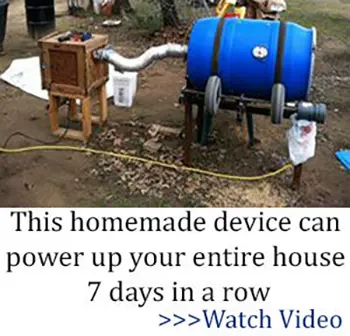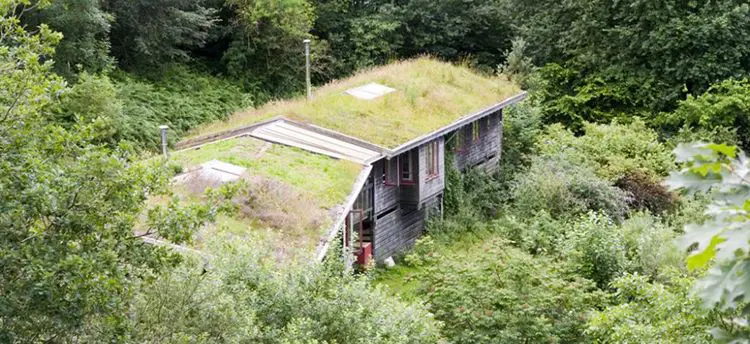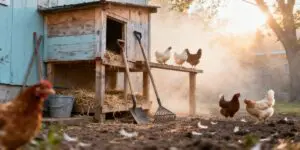Living off grid is not illegal in any of the 50 states – at least not technically. There are many simple off the grid living activities you can do anywhere, but some of the most essential infrastructure aspects of disconnecting from modern society are either strictly regulated or outright banned. Is it legal to go off the grid in your state?
You can grow your own food using off grid water delivery methods in all states throughout America. It is not illegal to operate a residential off the grid greenhouse. You can light, heat, and cool your livestock barn using off grid measures. It is when folks want to remove their homes from the electrical grid entirely and even put composting commodes in their bathrooms, that steep fines (or even jail time) can be levied in some states.
Off grid living laws not only vary by state, but often vary greatly in municipalities and counties, as well.
Most often the biggest hurdle to overcome when planning on off the grid home in any location, is putting in a septic system that will pass health department rules – even in rural areas.
Off Grid Living Variations Within States
The off grid state laws in the following section pertain to the entire state in general. Small to large variations in each off grid living category could very well be present depending on local laws that place restrictions surpassing the ones imposed by the state.
- Urban areas almost always have the most stringent restrictions in regards to off grid living.
- Affluent suburban areas, especially those with homeowners associations, also often boast prohibitive off grid living regulations.
- Even some small towns have now placed regulations on common off grid activities, especially when it comes to disconnecting from the power grid and sanitary sewer systems.
- Life can always be lived the most free out in the country. Laws in unincorporated areas in counties tend to be the most advantageous to off grid living fans. Many rural counties throughout the country do not have any zoning laws at all, outside of health department septic installation rules.
Rainwater Collection Codes
It is legal in all or most areas of all 50 states for residents to collect rainwater on private property.
Because it is legal to collect rainwater, that does not mean setting up a rainwater barrel collection system is also legal. Such systems could violate either state or local ordinances (or both) and might require the purchase of a permit.
Rainwater collection laws in some states are simple, while others have a myriad of exclusions.
Composting Toilet Codes
Many states do not reference composting codes in their state statutes at all. But, stringent rules regarding the disposal of raw sewage do exist in all 50 states. Typically, the lengthy guidelines governing sewage and septic systems can be found by visiting the state, county, or municipality website.
Some state guidelines may address the use of a composting toilet in new builds, but not in existing homes. Simply because a composting commode might be legal does not mean that an off the grid septic system, will be as well. United States building codes require in nearly every living situation, that a flush toilet that is connected to a government approved septic or sewer system, must exist.
ReCode, Portland, Oregon activist group, is working diligently to legalize sustainable sanitation systems across the United States. They has met with composting commode experts throughout the United States to help draft a composting toilet code for IAPMO (Universal Plumbing Code writers) to review. Many states in the West has now adopted the code which is included in the 2017 Water Efficiency Standard.
States which have addressed the composting code in any way, including those with pending legislative proposals, will be noted individually below.
Solar Energy
It is legal to install solar panels (sometimes with a permit) on your home and not use conventional power in all 50 states. But, not every state allows residents to install solar panels or to disconnect from the power grid entirely.
Nevada is just one of the states that requires a fixed fee for using solar energy to power your home – beyond the permit process many states require. Selling excess energy back to a conventional utility company is growing commonplace, but the amount received for supplying the energy also varies by both state and utility company provider.
You may have to remain connected to the power grid and pay a minimum connection fee even if you refuse to use the service. In some states or municipalities. Lenders and insurance providers may require such a connection, even if the state does not.
Power grid disconnection regulations vary so drastically by municipality, it is impossible to cover them all next to each listing below.
Most urban and many suburban municipalities boast the most stringent laws regarding electrical utility connection. Rural residents are far more likely to be able to build off grid in every state. Rural counties often do not have building codes, permit offices, or zoning laws outside of health department sewage regulations.
The best way to determine if complete or partial with a fee disconnection for the power grid is feasible in a specific area is to find out if the International Property Maintenance Code (IPMC) has been adopted by the municipality – and review both the state and local Uniform Building Code.
Basically, if a city, town, county, township, or village does not want residents or business owners to be able to disconnect from the power grid, they can simply pass a law preventing such action.
Unplugging From The Grid And Making Your Own Energy
Although rules and permits vary by state, you can actually unplug from the grid and make your own energy. In fact, some folks are making a little bit of extra money selling energy back to the electrical power companies.
Even businesses small and large are starting to unplug from the grid and make their own energy. A Kroger food distribution center in California installed a system that allows them to convert bacteria created by out of date or damaged bread and other organic material into biogas that is then burned to generate around 20 percent of the energy used on-site.
A detailed report by Home Power magazine revealed that more than 180,000 homes in the United States supply their own power entirely. Approximately one million homes have solar panels installed and allowed the family to at least partially rely on energy they produce themselves.
Another 27,000 homes use either wind or solar energy (or both) to go partially off grid, reducing their energy bills in the process. Because solar panels have decreased in price by roughly 50 percent since 2008, more Americans can afford to have them installed and provide more of their own energy.
What appears to be a growing number of states actually offer either tax breaks or income tax rebates to residents that purchase clean energy systems for their home. In 35 states with net metering laws it is both legal and possible to sell generated energy back to utility companies at retail rates.
The most popular ways Americans are unplugging themselves from the power grid to varying degrees are by the use of solar power, wind turbines, and hydropower.
The most difficult aspect of removing yourself from all modern utilities occurs when putting in a septic system.
Perhaps in the near future more states will allow the use of composting toilets and the cost of no-mess and surprisingly attractive units, will decrease as solar panels have.
Off Grid Living Legal Obstacles
Many state and local laws inhibit not just living off the grid projects but traditional homesteading activities in general. Fifty years ago it was far easier to live off the grid and make a living from your land than it is today.
Even if your state is quite off grid living friendly from a rainwater collection, solar panel, or even composting toilet standpoint,engaging in the following seemingly simple and common sense self-reliant living activities could cause you to wind up with a huge fine….or jail time.
#1. Selling raw milk from your off the grid homestead will get you arrested in most states. Some states permit the sale of “herd shares” where the co-owners of a dairy cow or dairy goat can garner a predetermined amount of milk in return for an investment in the animal.
#2. You better plan on building a permanent dwelling on your off the grid survival retreat. Pitching a tent or parking a motorhome long term (or eve short term in some states) can result in fines or an eviction from your own property.
#3. How small or large you build your off the grid home also matters. A minimum square footage ordinance in some municipalities could thwart any plans you have for economical tiny house off the grid living.
#4. Even if your off the grid home meets the minimum square footage requirements and is a permanent dwelling, it still might be deemed illegal. Before buying a used mobile home or manufactured home of any type and moving it onto your land, review local laws to make sure it also meets a minimum age requirements.
Saving money on a dwelling in order to invest the funds into an alternative energy system is only a great idea if the house being turned into an off grid home meets every last one of the town or county’s existing ordinances.
#5. Read the deed closely – go over it with the proverbial fine toothed comb, before buying what seems like a dream off grid property at a great price. Even in rural areas deed restrictions against keeping specific types of livestock or the number of livestock, can exist.
If you live in a “Right to Farm” state such instances are more rare, but such an ag-friendly designation does not necessarily exempt you from the long and heavy reach of government officials.
#6. If you are attempting to go off grid or even partially off the grid in a suburban area, engaging in typical self-reliance style living will likely be an ongoing hurdle.
If your disconnected property is subject to homeowners association rules, expect not to be able to use a clothesline to conserve energy when drying your clothes, connecting rainwater collection barrels to the side of your house, or perhaps even putting up what could be deemed “unsightly” solar panels on the roof of the home your already own.
The ability to grow your own groceries could also be vastly limited and specific types of containers or plots for their cultivation, mandated.
#7. How the processed waste from a composting toilet is used or disposed of may also pose a problem for off gridders. Using “humanure” to help a garden grow is still considered taboo in many communities or states.
Make certain to review not just the type of composting commodes allowed by your local health department when completing any permits or inspections (both will likely be required more than once) but also how the processed waste may or may not be used.
Off Grid Living Rules In All 50 States
Alabama
In this state harvesting rainwater is considered a property right. Both Auburn University and Alabama A&M extension services are not only urging more residents of the state they are offering guidelines and technical instruction to aid off grid water collection efforts.
You can live entirely off the grid in this state, but Alabama Power may charge a per kilowatt fee to residents who live partially or entirely off the grid. Composting commodes are not specifically outlawed in the state, but residents must prove they dispose of both gray water and raw sewage properly.
Alaska
Rainwater harvesting is the main water source for many Alaskan residents. But, groundwater harvesting can be considered a water right and is regulated. Alaska may be the most off grid friendly state in the union. Outhouse and composting commodes are fairly commonplace outside of urban areas. The use of solar and/or wind power is also routine in rural and remote regions of the state.
Arizona
House Bill 2363 created a joint legislative study on macro-harvested water to evaluate issues related to the collection of macro-harvested water. The study will investigate data related to rainwater harvesting and any impact it could potentially have on aquifer management, water rights, downstream uses, and groundwater management.
Arkansas
The Arkansas General Assembly passed a bill that directed the state board of health to permit the use of a harvested rainwater system used for a non-potable reasons if it has been designed by a licensed in-state engineer, complies with existing plumbing codes, and boasts proper cross-connection safeguards.
California
State Assembly Bill 1750 approved the Rainwater Capture Act in 2012. The legislation allows not only residential, but commercial and governmental landowners to set up, maintain, and operate rainwater catchment system, including barrel systems – for specific purposes that comply with already established regulations. Landscape or garden irrigation is a qualifying rainwater catchment system activity.
Colorado
Colorado House Bill 1005 made it legal for residential homeowners to set up two rain barrels – with a combined capacity of 110 gallons, to catch rainwater from their roof. The homeowners must use the water collected on their own property for only outdoor purposes. The rainwater collection must not interfere with any claims on already established water rights. Composting toilets are allowed in the state but outlined rules must be followed for disposal of raw sewage.
Connecticut
Rainwater collection is not currently restricted in the state. The Connecticut Department of Energy and Environmental urges residents to harvest rainwater.
Delaware
Rainwater harvesting is not restricted in Delaware and is encouraged via various incentive programs.
Florida
Residents in this state are also actively encouraged to harvest rainwater. Tax rebates and incentives are offered specifically in Manatee County. Composting commodes are permitted in the Sunshine State, as long as they follow health department usage guidelines.
Georgia
While rainwater harvesting is not illegal in Georgia, it is highly regulated. The state plumbing code mandates collected rainwater can be put to use outdoors only. The only way you could live off grid without collecting rainwater in this state would be to put in a water with a manual or alternative energy power pump or buy water – which would not be either economicable or sustainable.
Hawaii
The State of Hawaii does not have any restrictions on rainwater harvesting but in fact highly encourages it. Overseen by the Department of Health and Safety, Senate Concurrent Resolution 172 encourages county water boards to study and promote rainwater collection.
The Hawaii Senate Concurrent Resolution 172 was passed to urge rainwater collection throughout the island state. Collecting rainwater has been largely a rural off grid living activity in the state.
Idaho
No restriction on the collection of rainwater in this state exist, with the exception of capturing rain that has entered natural waterways. Composting commodes are legal in the state but health department use and raw sewage guidelines must be followed.
Illinois
A 2009 state bill paved the way for the Green Infrastructure for Clean Water Act which, among other things, promotes the collection of rainwater. In 2011, House Bill 991 was passed amend the Homeowners’ Solar Rights Act. The resolution now requires a homeowners’ association or similar entity, to respond within 120 days after a request to allow is made by a member to adopt an energy policy statement regarding several factors including: solar energy systems, rainwater collection, composting system, or wind energy, are allowed.
Composting commode must be in compliance with the expected number of user as stated by the manufacturer. Raw sewage must be processed through a sanitary sewer system governed by a municipality, to an incinerator, or a sanitary landfill that meets state regulations.
Indiana
Rainwater harvesting is entirely legal in this state. The Indiana government website urged the collection of rainwater and offers useful tips for doing so in both residential and business settings.
Iowa
No restrictions on rainwater collection exist in Iowa. Iowa has no regulations on rainwater collection.
Kansas
To harvest rainwater residents typically must garner a permit from the Department of Agriculture. may be required. The right to collect rainwater is protected by the Kansas Water Appropriation Act.
Kentucky
No restrict of rainwater harvesting exist in this state. The Kentucky government website offer tips for building a rain barrel system.
Louisiana
Collecting rainwater in the state is allowed, but a series statewide statutes governs large collection cisterns.
Maine
Residents of this state are free to harvest rainwater on their property without following any government regulations. In some cities stormwater fees are used to pay for improvements to municipal stormwater systems.
Maryland
Collecting rainwater is legal throughout the state. In specific counties, incentives are offered for creating such systems.
Massachusetts
Rainwater collection is both legal and encouraged in this state. Composting toilet systems are allowed, as long as health department guidelines are followed.
Michigan
The Cost Effective Governmental Energy Use Act made the harvesting rainwater and other energy and cost efficiency techniques, legal in the state. This state has some of the oldest gray water and composting system on the books. While no statewide sanitary code has been approved, a total of 46 county health departments has established a set of related criteria.
Minnesota
Residents do not face any rainwater collection restrictions in the State of Minnesota.
Mississippi
Rainwater collection is legal without permit in the State of Mississippi.
Missouri
The state both permits and urges the harvesting of rainwater in Missouri.
Montana
The state government does not place any restrictions on rainwater collection and encouraged residents of Montana to engage in the off grid practice.
Nebraska
Residents can collect rainwater and create barrel system in Nebraska.
Nevada
State Assembly Bill 198 mandates that the Legislative Committee on Public Lands study how alternative water sources impact communities throughout Nevada. The study also includes a review of impact of rainwater harvesting practices and other forms of alternative water sources.
New Hampshire
No restrictions or permits are required to collected rainwater in this state. Current New Hampshire laws promote the sustainable practice.
New Jersey
State Assembly Bill 2442 mandate the New Jersey Department of Environmental Protection to create a Capture, Control, and Conserve Reward Rebate Program. The program funding will be used to supply water conservation rebates for property owners that engage in eligible water control, capture, control or conservation activities.
New Mexico
A rainwater harvesting tax income incentive up to $5,000 has been introduced to urge both residents and businesses to collect rainwater for future use. Reintroduces Water Harvesting Tax Income to incentivize individuals and businesses to collect rainwater for future uses.
New York
Both homeowners and businesses who include rainwater harvesting, green infrastructure, rain gardens, green roofs, and similar systems to new homes can receive a tax credits up to 50 percent of construction costs.
North Carolina
State House Bill 609 requires the North Carolina Department of Environment and Natural Resources to supply both technical assistance and outreach, along with a guide to best practices on the use of water conservation, rainwater harvesting, and how to use use gray water. North Carolina Senate Bill 163 acknowledged the benefits of using rainwater and other forms of reclaimed water to enhance the state water supply for the future.
No laws pertaining to composting commodes are currently on the books in North Carolina.
North Dakota
The State of North Dakota currently has some stringent laws regarding how water sources are used, but actively encourages rainwater collection.
Ohio
The Buckeye State fully permits rainwater harvesting for potable purposes. A private residential drinking water system serves even less than 25 people, does still fall under state regulation though. Composting toilets are allowed, but only if they meet established regulations and are inspected by the health department or an approved contractor.
Oklahoma
State House Bill 3055 ushered in the Water for 2060 Act. The law established grants for water conservation projects that can include collecting rainwater and the use of gray water.
Oregon
In this state rainwater can only be harvested from rooftop surfaces. State regulations also permit varying methods of rainwater collection. Rainwater harvesting is allowed in Oregon, but may only be done from roof surfaces. Oregon Building Codes Division allows rainwater harvesting systems to be used as an alternate method to conventional state plumbing codes.
The regulations apply to both potable and non-potable systems. Oregon Senate Bill 79 requires the building code office to enhance energy efficiency by several means, including rainwater harvesting, in both new and repaired structures. directs the BCD to increase energy efficiency by including rainwater harvesting, in new and repaired buildings.
Pennsylvania
Harvesting rainwater is encouraged in Pennsylvania and no restrictions exist to curtail setting up a barrel collection system. Composting commodes with a NSF testing seal and approval meet state regulations. Before installing a composting commode a permit must ge garnered for sewage disposal and excess gray water treatment.
Rhode Island
This state House Bill 7070 establisheda tax credit for homeowners or businesses that installs rainwater collection cisterns on their property. The law defines a cistern as a container that holds a minimum of 50 gallons of divert rain or snow. The cistern can be established either on or below the ground. A cistern is defined as a container holding fifty or more gallons of diverted rainwater or snow melt, either above or below ground
South Carolina
Residents and businesses can collect rainwater without a permit or restriction in South Carolina, and are encouraged to do so. Only composting commodes that process sewage through a state approved septic system are allowed.
South Dakota
Like its neighbor to the north, South Dakota has multiple laws regulating water rights, but collecting rainwater is legal without permit.
Tennessee
Green infrastructure practices are allowed in places that also have combined stormwater and sanitary sewage systems. The definition of a permissible sewage system was expanded to include rain gardens, cisterns, and other forms of green infrastructure.
Texas
State House Bill 3391 is a massive bill that amended multiple sections of Texas law pertaining to rainwater collection. Loans can now be offered for properties that will only have rainwater as a water source. All new state buildings with a roof that measures at least 50,000 square feet in portions of the states that get a minimum of 20 inches of rain must incorporate rainwater harvesting systems for both potable and non-potable indoor use, into their design.
Regulations referencing the maintenance or installation of rainwater collection systems designed for potable indoor use and are also connected to a public water supply system, ere andated for development. Safe drinking standards must still be met and the rainwater collected cannot come into contact with the public water supply.
All counties and municipalities in Texas are now urging rainwater collection systems via discount incentives for both rainwater barrels and water storage facilities. Training regarding rainwater collection must now be offered by the Texas Water Development Board on an at least quarterly basis. Municipalities are prevented from denying a request for a building permit simply because rainwater harvesting will be implemented.
Utah
Residents who own or lease a property are allowed to both collect and store rainwater. Utah Senate Bill 32 limits anyone registered with the Division of Water Resources to collecting a maximum of 2,500 gallons of rainwater. If the resident is not registered, only two containers can be used to collect a maximum of 100 gallons of harvested rainwater.
Vermont
Harvesting rainwater is completely legal without permit in the State of Vermont.
Virginia
Senate Bill 1416 created the Alternative Water Supply Assistance Fund. The fund offers income tax credits to both people and corporations that install rainwater collection systems. State laws also required a set of gray water and rainwater collection guidelines be created in an effort to both promote conservation and to reduce the growing demand placed on the public water supply.
Virginia also requires the development of rainwater harvesting and gray water guidelines to ease demands on public treatment works and water supply systems and to promote conservation.
Washington
Counties in the state are allowed to decrease stormwater control facilities fees that use rainwater harvesting systems. In 2009 the Washington Department of Ecology released an Interpretive Policy Statement stating a water right is not for a resident to harvest rainwater.
West Virginia
There are no restrictions on harvesting rainwater in West Virginia.
Wisconsin
Residents are allowed to collect rainwater on their own property without restriction or permits in Wisconsin.
Wyoming
No permit is required to harvest rainwater on your own property in Wyoming.
Going off the grid either partially or fully is a realistic dream in the vast majority of states, as long as you choose the right municipality, review all rules carefully before installing, and apply for any permits that are required.
You may also like:
How to Make Emergency Survival Bread
How To Make Aaruul: One Of The Best Survival Foods (Video)
How to Build a 44-Day Stockpile for Only $2.40 a Day














